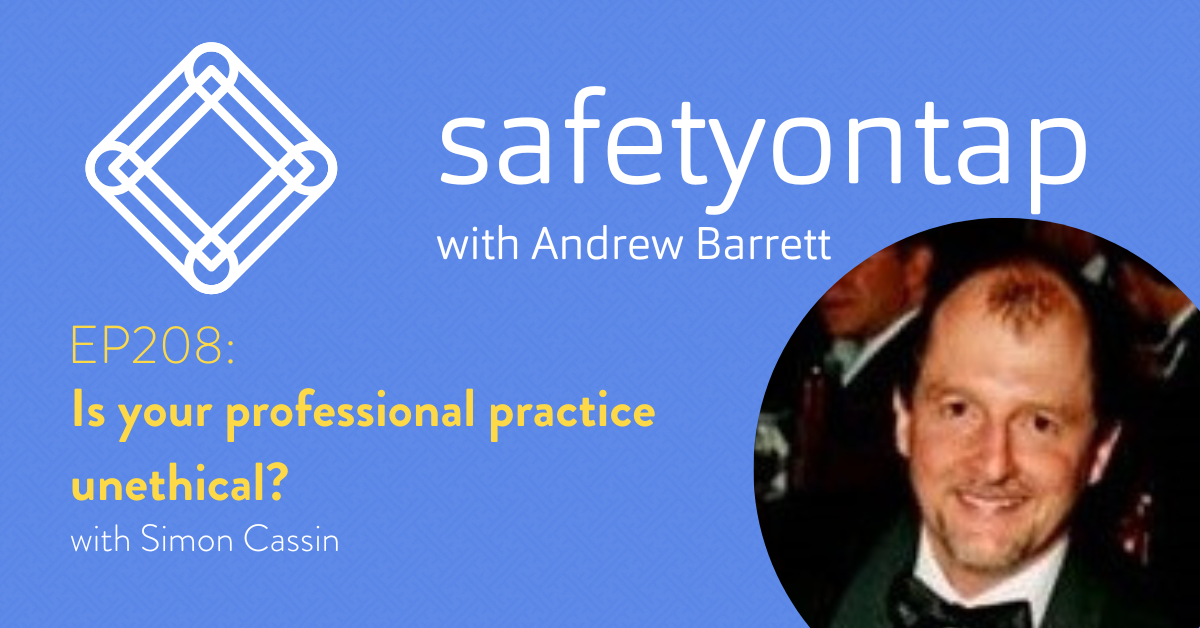Is your professional practice unethical?
Hey, it’s Andrew, and this is Safety on Tap.
Since you’re listening in, you must be a leader wanting to grow yourself and drastically improve health and safety along the way. Welcome to you, you’re in the right place. If this is your first time listening in, thanks for joining us and well done for trying something different to improve! And of course welcome back to all of you wonderful regular listeners.
Let’s begin with an agreement, I’d like to agree somethings with you before you keep listening.
The first is that the work of health and safety is a fundamentally ethical thing, we do what we do because we believe it is what is right. So the first thing I’d like to agree on is that we can’t talk about health and safety without talking about ethics.
The second, is that we either can’t, or shouldn’t, call ourselves professionals if we don’t understand the fundamentals of what we say and do. Plenty of people might know the words and activities of health and safety at a surface level, but what separates them from professionals like us is our greater grasp of the fundamental aspects of health and safety and all that entails. That’s the second agreement – to be professional means a greater fundamental grasp of the nature of what we do and why.
If you don’t agree with these, stop listening, there isn’t any point because this conversation will be nonsensical to you. If you do agree, then this might make sense, in which case it also might be helpful to you. You decide.
Ok, you’re still here, let’s proceed.
Today’s guest is Simon Cassin. Simon has real range – from serving his community as a fire fighter, to lived experience of harm at work, through ongoing study and practice in the arenas of philosophy and health and safety, and importantly how the two interact.
Here’s Simon:
This dialogue was pretty thick, and it is for a reason. These questions of philosophy – or what is the fundamental nature of things, of ethics – or what is morally right and good, and of wisdom – are core questions for professionals.
If it was difficult to follow and unfamiliar to hear, then you are on the right track. I myself only begrudgingly engaged seriously with the philosophy of my work a few years ago, and it has changed my life.
Takeaway #1:
Simon said, “I can change my mind now, because I am attached to nothing except the pursuit of widsom”. What a beautiful and deep insight. I take this as encouragement, that we can’t go wrong if you are always in pursuit of what is right. And to do that, we have to know that we don’t really know much, so the pursuit is the goal, not the knowing. I see dangerous professional behaviour all the time, when we persist with stuff without basis, or in the face of contrary evidence, or when we declare we know, which means we stop searching. It feels hard to say, I was wrong, or I changed my mind, but its always worse when we simply don’t.
Takeaway #2: It’s easy to reject philosophy as fluffy, or vague, or too theoretical and not practical. I did it for years. But Simon has just spanned a wide gap for us – that ethical professional practice is inherently tied up with the pursuit of knowledge, which we can call professional development, AND that ongoing development helps us in our pursuit of knowledge and ethical practice – doing more of what is right and what works.
Takeaway #3: I’m using the language of ‘right’ or what is ‘right to do’ as a professional. Simon introduced us to Kant’s concept of ‘ought implies can’. I really suggest you Google this, it deserves more than I can give it now. Ought implies can is a shortening of the idea that ethical practice is only possible when we have clarity about what we should/ought do, AND we are capable of doing that. Is it ethical to expect an investigator to suddenly become a learning facilitator? Is it ethical to reward professionals who provide definitive answers and tell people what to do, and suddenly want them to ask more questions and treat others as collaborative experts too? Is it ethical to expect due diligence from managers but not give them the skills to understand work as done? We can’t expect ethical behaviour if the capability for ethical behaviour isn’t there. Again, this ties the philosophical to the practical really tightly. Should, or ought, is one of the most dangerous words a professional can use.
I hope you see the world a little differently after that conversation, and if we’ve done a half decent job you should also feel a little unsure and a little uncomfortable. That means we are all on the right track.
You can get a copy of the transcript of this episode at safetyontap.com/ep208 along with a link to the OHS Body of Knowledge chapter on ethics – which is a great next step in your pursuit of wisdom.
Thanks so much for listening. Until next time, what’s the one thing you’ll do to take positive, effective or rewarding action, to grow yourself, and drastically improve health and safety along the way?
Seeya!
OHS Body of Knowledge: Chapter 38.3 Ethics and professional practice https://www.ohsbok.org.au/wp-content/uploads/2019/11/38.3.-Ethics-and-professional-practice.pdf
Transcript – Ep208: Is your professional practice unethical?
Feel free to share this with your team/colleagues!

